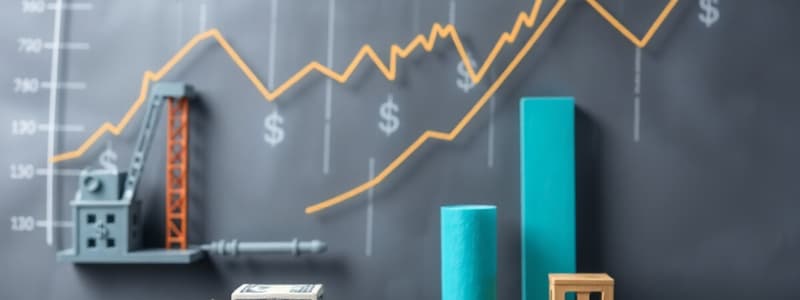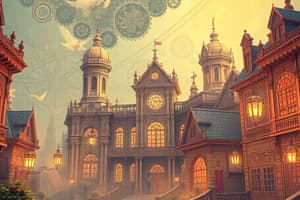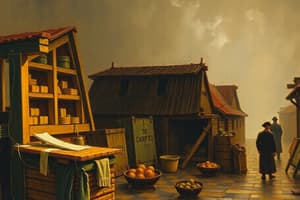Podcast
Questions and Answers
What does scarcity refer to in economics?
What does scarcity refer to in economics?
- Excess labor in the market.
- Unlimited resources available for consumption.
- The balance between supply and demand.
- Limited resources versus unlimited wants. (correct)
Which of the following economic systems relies on customs and traditions?
Which of the following economic systems relies on customs and traditions?
- Market Economy
- Mixed Economy
- Traditional Economy (correct)
- Command Economy
What does GDP measure?
What does GDP measure?
- Total value of all goods and services produced in a country. (correct)
- Rate of inflation in a country.
- Total savings of a country.
- Percentage of unemployed individuals.
Which economic theory asserts that government intervention is necessary during economic downturns?
Which economic theory asserts that government intervention is necessary during economic downturns?
What best describes a monopoly?
What best describes a monopoly?
What is the primary goal of fiscal policy?
What is the primary goal of fiscal policy?
What is inflation characterized by?
What is inflation characterized by?
What aspect does globalization primarily enhance?
What aspect does globalization primarily enhance?
Flashcards are hidden until you start studying
Study Notes
Definition of Economics
- Study of how societies allocate scarce resources.
- Involves the production, distribution, and consumption of goods and services.
Key Concepts
- Scarcity: Limited resources versus unlimited wants.
- Supply and Demand:
- Supply: Amount of a good available.
- Demand: Desire for a good, influencing price and availability.
- Opportunity Cost: The value of the next best alternative foregone when making a decision.
Economic Systems
- Traditional: Based on customs and traditions.
- Command: Central authority makes decisions (e.g., socialism, communism).
- Market: Decisions made through market forces (e.g., capitalism).
- Mixed: Combination of market and command systems.
Major Economic Theories
- Classical Economics: Market self-regulation, importance of free markets.
- Keynesian Economics: Government intervention necessary during economic downturns.
- Monetarism: Focus on the role of governments in controlling the amount of money in circulation.
Economic Indicators
- Gross Domestic Product (GDP): Total value of all goods and services produced in a country.
- Unemployment Rate: Percentage of the labor force that is unemployed.
- Inflation Rate: Rate at which general price levels rise, eroding purchasing power.
Types of Markets
- Perfect Competition: Many buyers and sellers, homogeneous products.
- Monopoly: Single seller dominates the market.
- Oligopoly: Few large sellers, significant market control.
Fiscal Policy
- Government's use of spending and taxation to influence the economy.
- Aims to promote economic stability and growth.
Monetary Policy
- Central bank's management of the money supply and interest rates.
- Influences inflation and overall economic activity.
International Economics
- Trade Balance: Difference between exports and imports.
- Exchange Rates: Value of one currency measured against another.
- Globalization: Increased interconnectedness of economies around the world.
Economic Challenges
- Recession: A period of economic decline characterized by falling GDP.
- Inflation: Rising prices that decrease purchasing power.
- Income Inequality: Disparity in wealth distribution among individuals.
Contemporary Issues
- Impact of technology on labor markets.
- Sustainability and environmental economics.
- Economic implications of globalization and trade policies.
Definition of Economics
- Economics studies how societies manage limited resources to fulfill unlimited wants.
- It encompasses the production, distribution, and consumption of goods and services.
Key Concepts
- Scarcity is the fundamental economic problem: there are limited resources available to meet unlimited wants.
- Supply and Demand forces determine prices and resource allocation.
- Supply refers to the amount of a good producers are willing to offer.
- Demand reflects consumers' desire for a good.
- Opportunity Cost is the value of the best alternative forgone when making a choice.
Economic Systems
- Traditional Economies rely on customs, traditions, and historical precedents for economic decision-making.
- Command Economies have a central authority that controls resource allocation and production.
- Examples include socialism and communism.
- Market Economies rely on market forces (supply and demand) to drive economic decisions.
- Capitalism is a prominent example.
- Mixed Economies combine elements of both market and command systems.
Major Economic Theories
- Classical Economics emphasizes the self-regulating nature of markets and the importance of minimal government intervention.
- Keynesian Economics advocates for government intervention during economic downturns to stimulate demand and promote growth.
- Monetarism focuses on the role of the central bank in controlling the money supply and its impact on inflation and economic activity.
Economic Indicators
- Gross Domestic Product (GDP) measures the total value of goods and services produced within a country.
- Unemployment Rate reflects the percentage of the labor force that is unemployed.
- Inflation Rate measures the rate at which general price levels increase, eroding purchasing power.
Types of Markets
- Perfect Competition exists when many buyers and sellers trade identical products.
- Monopoly occurs when a single seller dominates the market.
- Oligopoly involves a few large sellers, typically with considerable market control.
Fiscal Policy
- Fiscal Policy is used by governments to influence the economy through spending and taxation.
- Its aims include promoting economic stability and growth.
Monetary Policy
- Monetary Policy involves central banks managing the money supply and interest rates.
- It impacts inflation and overall economic activity.
International Economics
- Trade Balance reflects the difference between a country's exports and imports.
- Exchange Rates determine the value of one currency compared to another.
- Globalization describes the increasing interconnectedness of national economies through trade, investment, and technology.
Economic Challenges
- Recession signifies a period of economic decline, characterized by falling GDP.
- Inflation can erode purchasing power by increasing general price levels.
- Income Inequality refers to the unequal distribution of wealth among individuals in a society.
Contemporary Issues
- The impact of technology on labor markets and the rise of automation.
- Sustainability and environmental economics, addressing the interplay between economic growth and environmental protection.
- The economic implications of globalization, trade policies, and international relations.
Studying That Suits You
Use AI to generate personalized quizzes and flashcards to suit your learning preferences.




